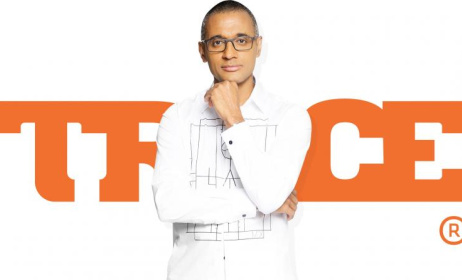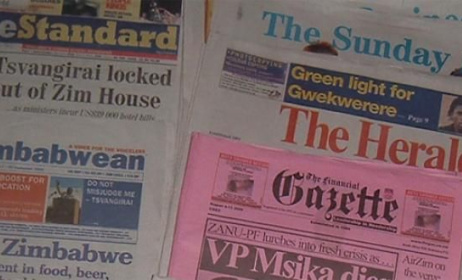Music in the Rwandan media
By Kalinda Brendah
The music industry in Rwanda is growing fast and the media has played a big role in its growth. Indeed the media has influenced the music industry in Rwanda in many ways. Over the years, the Rwandan music industry has made remarkable strides. The quality of both audio and video production has improved tremendously, helping musicians to attain a larger audience than before. In this regard, the contribution of local radio and TV stations as well as online media can’t be overstated. These have helped engage more followers by prioritizing locally produced songs over foreign ones. This text provides an overview of some of the main music-related media outlets in Rwanda.
 Rwanda Print Media. Photo:www.greatlakesvoice.com
Rwanda Print Media. Photo:www.greatlakesvoice.com Satelite Dish. Photo:www.itnewsafrica.com
Satelite Dish. Photo:www.itnewsafrica.com
Radio
Radio is the most important channel through which ordinary Rwandans receive information on the country’s news and music. The first radio station was owned by the state. Radio Rwanda was established in 1961 and remained the sole operator until the establishment of other radio stations in 2004. It was officially inaugurated on 19 May 1961, although test broadcasts began three months earlier. From 1961 to 1962, Radio Rwanda developed its infrastructures with equipment from outside the country, enabling it to cover 80% of the country by 1978.
In 1993, during the war between the Rwandan Patriotic Front (RPF) and the Rwandan government, Radio Rwanda lost its monopoly with the creation of the private station Radio Télévision Libre des Mille Collines (RTLM). After the 1994 Genocide against Tutsis and moderate Hutu, Radio Rwanda once again became the only radio station operating in the country until 2002when the law allowed for the creation of private radio stations. From this period many private radios were rapidly created.[i]
Today, there are so many radio stations - that it’s difficult to keep track of all of them. There are approximately 33 radio stations registered in Rwanda they include commercial, religious and community stations. The biggest radio stations include 98.7 KFM[ii], Kiss FM[iii], KT Radio[iv], Radio 10[v], Flash FM[vi], Radio Salus[vii], City Radio[viii], Radio One 91.1FM[ix], Contact FM[x] and Magic FM[xi].
Because radio reaches all corners of the country, it is the preferred media for most rural Rwandans. Outside Kigali, other parts of the country have smaller or community radio stations owned by the government, such as RC Musanze, Rubavu and Karongi. In every district there is a radio owned by the government. Rural citizens often know more about music in Rwanda than urban Rwandans because they are constantly glued to their radios!
Christian stations are also popular in Rwanda. These include Ubuntu Butangaje (aka Amazing Grace Christian Radio 105.1)[xii], Authentic Radio 92.8FM[xiii], Sana Radio (aka Restore FM)[xiv], Radio Umucyo 102.8FM[xv], Voice of Hope (affiliated to Adventist World Radio), Voice of Africa 94.7 Kigali FM[xvi] and Radio Maria[xvii], among others. These stations play music by both international and local gospel musicians, according to their religion beliefs.
There are particular shows that are dedicated to Rwandan music. It is in these shows that the presenters will inform the public on the latest music shows and concerts upcoming by the same musician. Most Rwandan radio stations and televisions are now streaming online and some have their own Youtube channels. Among them are ‘Isango na Muzika’ hosted by Phil Peter on Isango Star Radio[xviii] and ‘1on1’ hosted by Anangwe on Contact FM[xix].
Television
The first television station in Rwanda, known as Rwanda TV, was established in 1992. It is government owned and has since been transformed to Reba TV, under the Rwanda Broadcasting Agency (RBA)[xx].
Today a number of other private television stations have risen. Each has allocated much time to promote local music and musicians. These include TV10[xxi], TV1[xxii], Lemigo TV[xxiii], FamilyTV[xxiv] and Yego TV[xxv], among others. Occasionally, local TV stations will air music video for the general population to enjoy, while there are various talk shows that look into the local music industry, such as ‘Celebrity Show’ hosted by Lucky Nzeyimana on Family TV[xxvi].
Regional pay-TV providers like DStv, GoTV and StarTimes are not easily affordable to most Rwandans. However, a number of people have acquired their services and enjoy international music that is aired on the various channels, the most popular of which are MTV and Trace Urban.
Print Media
Rwandan newspapers follow the local music industry and frequently update readers on chart news and album launches, for example. In this way, the public is kept abreast of new trends, even if one is not a party fanatic. The print media also carry up-to-date information on foreign artists and international music trends.
Rwanda’s main newspaper is The New Times, which includes a daily column (both in print and online) dedicated to entertainment highlights and provides more extensive report over the weekends [xxvii].
The other leading newspapers are Imvaho Nshya[xxviii] and Izuba[xxix] which are in Kinyarwanda, Rwanda’s official language.
Online Media
The use of modern technology is revolutionizing the way information is shared, including how music is sold and consumed. A growing number of websites feature Rwandan music and provide worldwide access to Rwandan music, musicians’ profiles, lyrics, news and events. Examples of such sites include IGIHE[xxx]; Inyarwanda[xxxi], Umuseke[xxxii], Imirasire[xxxiii], Yegob[xxxiv], Rwanda Paparazzi[xxxv] and Kigali Today[xxxvi], among others. Popular online news platforms include The Rwandan[xxxvii] ; The Rwanda Focus[xxxviii]; and News of Rwanda[xxxix] .
Musicians in Rwanda are increasingly using online media for promoting their music. Album sales have been outstripped by digital downloads and streaming. Facebook, Twitter, Youtube and Instagram have therefore come to dominate the music industry, with many musicians using these platforms to promote their art.
Most Rwandan musicians started their career online before they became known in the mainstream media. The social media craze has not left Rwanda behind and most telecom companies allow free use of Facebook on their mobile networks. This has allowed owners of even the most basic cellphones (provided they have internet access) a chance to always know what’s happening in the music scene.
Language
The Kinyarwanda language dominates the local music industry, with most musicians choosing to use it to relay their messages. This is because Kinyarwanda is widely spoken and understood in many parts of the country compared to other languages and most Rwandan musicians have a low education background. Most are not fluent in foreign languages like English or French. Kinyarwanda is therefore considered the most effective way of spreading news around the country - unless there is a big music story in Rwanda, in which case you find journalists trying to translate it into English so that they share it worldwide,
Rwandan musicians have realized that listeners identify more closely to songs that are sung in a local language because it gives them a feeling of belonging. Lately, however, more and more musicians have been going against the grain, singing in English or mixing English with Kinyarwanda and/or Swahili – in order to break into the larger East African or global market.
Media freedom
Rwanda’s constitution (Article34) states that “freedom of the press and freedom of information are recognized and guaranteed by the state.” However, other clauses broadly define circumstances under which these rights can be restricted, and in practice the media remain under the tight control of the government. The country’s 2009 media law sets out strict regulations, accreditation requirements and licensing procedures. It also requires journalists to reveal their sources to the government for criminal investigations.
The law also prohibits the propagation of ideas based on “ethnic, regional, racial, religious, language, or other divisive characteristics.” Public incitement to ’divisionism’ is punishable by up to five years in prison and fines of up to 5 million Rwandan francs (about US $7000). Statutes also forbid defamation of the head of state or other public officials, which can carry up to five years in prison and fines of up to RWf10 000 ($14). These laws are generally seen as vague and sweeping in breadth.[xl]
Despite the role played by media in the genocide (Thompson, 2007), Rwanda’s media today is one of the strongest weapons used to fight against divisions in society, and the government works with the youth in organizing events that promote unity, such as Walk to Remember[xli].
However the government has banned some videos deemed explicit or contradicting the rules that artists are given whenever going to shoot videos. These include ‘Ancilla’ by Urban Boyz[xlii], Dr Jiji’s ‘Welcome to Bed’[xliii], ‘Antere Ibuye’ by Dr Jiji, Ama G The Black and Bruce Melodie[xliv] and ‘I Like You By’ by Fearless[xlv]. All these video were banished in 2014 through the Rwanda Media Commission (RMC)[xlvi], the current regulatory body. Nevertheless, Rwanda continues to develop rapidly in all sectors, including entertainment.
Suggested further reading:
1. Ndikubwayezu, G. 2011. ‘Rwandan Media Today‘. Available online here. 2. Media High Council. 2011. ‘New list of licensed media organs in Rwanda’. Available online here. 3. Thompson, A. (ed.) 2007. The Media and the Rwanda Genocide. Kampala: Fountain. Available online at here. 4. Freedom House. 2014. ‘Rwanda’. Available online at here. 5. United Nations. 2014. ‘Rwanda media barometer launched on World Press Freedom Day’. Available online here. [i] www.memoireonline.com [ii] www.kfm.co.rw [iii] www.kissfm.rw [iv] www.ktradio.rw [v] www.radio10.rw [vi] www.flashfm.rw [vii] www.salus.ur.ac.rw [viii] www.facebook.com [ix] www.facebook.com/pages/Radio-ONE [x] twitter.com/radiocontactfm [xi] rba.co.rw/magic-fm [xii] www.facebook.com/pages/Amazing-Grace-Christian-Radio-1051/366895393424372 [xiii] www.facebook.com/pages/Authentic-Radio-928-FM/572721002773800 [xiv] www.bvbroadcasting.org/projects/rwanda-radio [xv] www.umucyoradio.com [xvi] www.facebook.com/pages/Voice-Of-Africa-947-FM/272221542924131 [xvii] www.radiomaria.rw [xviii] www.youtube.com/watch?v=7fA9eeqLUzE [xix] www.youtube.com/watch?v=RQ-2pj8yPfE [xx] www.rba.co.rw [xxi] www.facebook.com/tv10rwanda [xxii] tvonerwanda.com [xxiii] www.lemigo.tv [xxiv] www.facebook.com/familytvrwanda [xxv] www.facebook.com/yegotv [xxvi] www.youtube.com/user/TheCelebritieshow [xxvii] www.newtimes.co.rw [xxviii] www.imvahonshya.co.rw/ [xxix] www.izuba-rirashe.com [xxx] http://igihe.com/ [xxxi] http://inyarwanda.com [xxxii] www.umuseke.rw [xxxiii] http://imirasire.com [xxxiv] http://yegob.com/ [xxxv] http://rwandapaparazzi.rw [xxxvi] www.kigalitoday.com [xxxvii] www.therwandan.com/ [xxxviii] www.focus.rw/wp [xxxix] www.newsofrwanda.com / [xl] www.freedomhouse.org [xli] www.facebook.com/walktorememberinternational [xlii] www.youtube.com/watch?v=ekEMO-8Ifvk [xliii] www.youtube.com/watch?v=PWYKt3OfsVw [xliv] www.youtube.com/watch?v=NgHb_TdVCes [xlv] www.youtube.com/watch?v=nHEk9QX4cj8 [xlvi] rmc.org.rw


























Commentaires
s'identifier or register to post comments